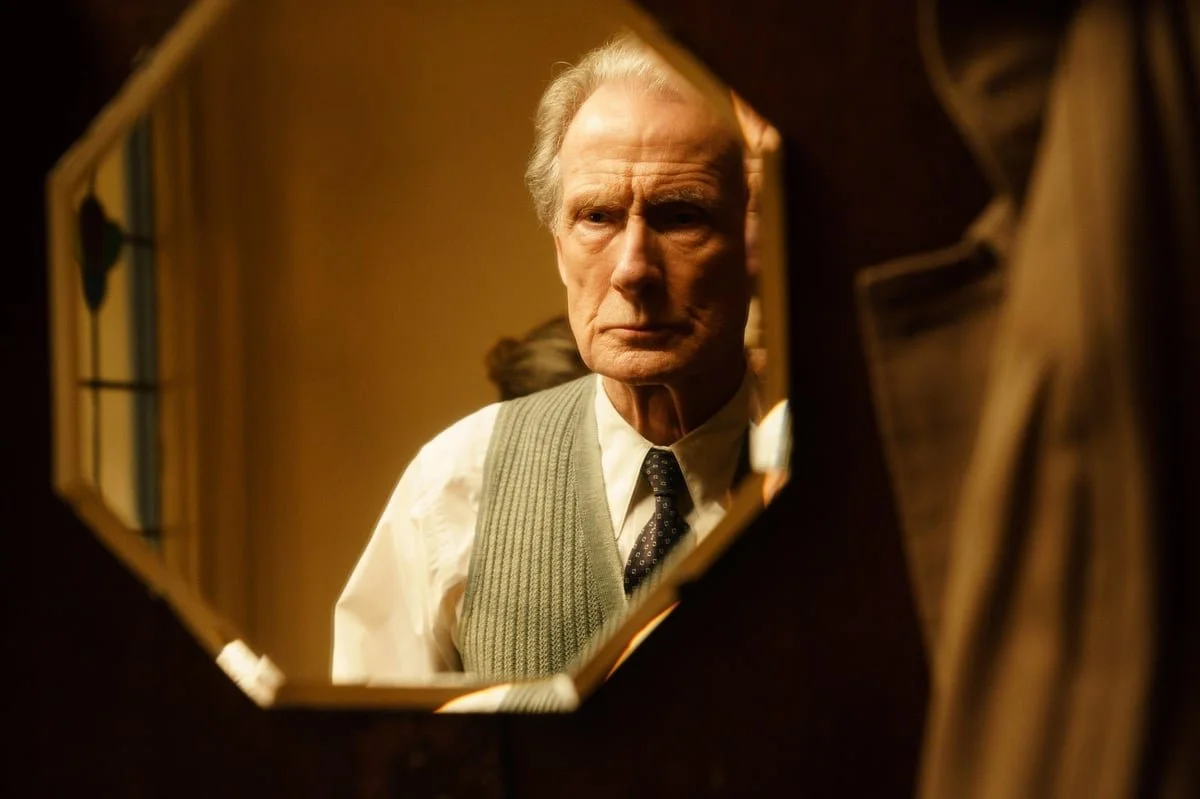LIVING
A matter of Nighy and death.
While the immense impact of Akira Kurosawa means his presence can be keenly felt across cinema many decades after his passing, perhaps wisely, there have been relatively few attempts to take this influence one step further and remake his work. I mean, why put the pressure on yourself, right?
Some have tried and, naturally, few have succeeded, so the cards were really stacked against Living before even a word of doleful dialogue had been written. However, against all the odds, this one may be that rarest of things – a Kurosawa adaptation that goes on to live its very best life.
Receiving a devastating medical diagnosis, giving him just months to live, veteran civil servant, Mr Williams (Bill Nighy), is inspired to pack some fun into his remaining days. With the help of an affable young colleague, Margaret (Aimee Lou Wood), Mr Williams rediscovers the pep that had previously eluded him, making the supreme effort to turn his dull life into something truly wonderful.
With no samurais, no bloodshed, and no Toshiro Mifune, Ikiru was always one of Kurosawa’s more unique offerings. A tale of tender poignancy and subtle humanity, the film is utterly unlike anything else in the director’s filmography, and while few other Kurosawa films offer much remake wiggle room, Ikiru represents perhaps the best opportunity to do something interesting and a little different with the source material.
Although Living certainly evokes the controlled energy and restrained spirit of Ikiru, there’s no denying that it brings its own inimitable personality to the table. The bar its predecessor has set is undoubtedly a high one, however, while Living doesn’t quite hit that, it gets as close as you could possibly hope for.
A throwback in every respect, Living appears positively ripped from the era it depicts, as director Oliver Hermanus thoroughly embeds us in its time and place. Shot with a sorrowful softness and a gorgeous, gentle grain, the film makes no bones about its nostalgic inclinations, setting its sentimental stall out early and riding that tone until the very end.
Even from its dour, exceedingly clipped beginnings, Living knows precisely what it is and what it wants to convey, and while the incredibly deliberate pacing won’t be for everyone, its affecting, achingly human subject feels utterly universal, with its slow burn approach ensuring that even the most minor shift in character development feels positively monumental.
With his first screenplay since 2005’s The White Countess, Kazuo Ishiguro’s script sticks closely to Kurosawa’s original, making full use of Ikiru’s unique structure and tone while navigating through it all in its own way. While keeping the period setting roughly the same, Living nonetheless transports the story wholesale, seamlessly taking us from post-war Tokyo to post-war London in a move that delicately balances reverence with an overt desire to be its own thing.
Slow and decidedly steady, Ishiguro’s script certainly isn’t in a rush to get where it’s going, a move that will undoubtedly test the patience of some, yet this unhurried, deliberate pacing very much works in the film’s favour. Combined with Oliver Hermanus’ smartly measured direction and Emilie Levienaise-Farrouch’s wonderfully redolent score, Ishiguro’s writing embeds us deep in the story, its characters, and its era, leaving us to sit with every moment to let it all soak in.
The result is something quite special, not because Living offers anything particularly revolutionary, but because of the resolute, quietly poignant way it portrays Mr Williams’ personal revolution. Of course, such a journey of mortality-facing self-discovery isn’t particularly unique in cinema, however, where many similarly themed films may be tempted to embrace overcooked sentimentality, Living avoids it altogether, preferring instead to keep things discreet and heartbreakingly subtle.
In rare form, Bill Nighy uses all this as the foundation for the performance of his career, one that elevates a potentially drab, dour affair to another level entirely. Stripped of the quirks and affectations we’ve become accustomed to, Nighy plays things as deathly straight and as muted as the role requires, immediately throwing up an emotional barrier that’s only lowered when the emotional time is just right.
Striking up an affecting, complementary partnership with the delightful Amy Lou Wood, Nighy’s performance is a beautifully delicate one full of controlled gravitas and a pointed subtlety he’s rarely showcased in his career. A lesser actor could’ve easily stumbled on Living’s tonal tightrope, yet Nighy walks it with ease in a performance that gradually evolves into a wonderful balance of life-affirming joy and heartrending sorrow.
While well-mannered and sentimental to a fault at times, through Oliver Hermanus’ astute direction and Kazuo Ishiguro’s delicate script, Living steadily grows to become a gently affecting, heart-warming delight. In the form of his career, Bill Nighy puts in a thoughtful, pitch perfect performance that will both lift and break you. If you’re going to remake Kurosawa, this is how you do it.




